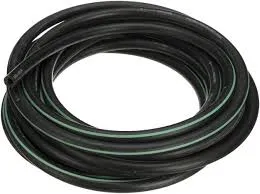Understanding Fuel Injection Hose Specifications and Maintenance Best Practices for Optimal Performance
Nov . 10, 2024 19:05 Back to list
Understanding Fuel Injection Hose Specifications and Maintenance Best Practices for Optimal Performance
Understanding Fuel Injection Hose A Vital Component for Automotive Performance
In the realm of automotive engineering, every component plays a crucial role in ensuring the optimal performance of an engine. Among these components, the fuel injection hose holds significant importance, acting as a vital link in the fuel delivery system. Understanding the function, composition, and maintenance of fuel injection hoses is essential for both manufacturers and consumers alike, as it directly relates to the efficiency and reliability of vehicles.
What is a Fuel Injection Hose?
Fuel injection hoses are specialized tubing designed to transport fuel from the fuel tank to the engine's fuel injectors. Unlike traditional carburetors, which mix air and fuel before delivering it to the engine, modern fuel injection systems require high-pressure fuel to be accurately metered and delivered. The hose must withstand not only high pressure but also the corrosive properties of gasoline and diesel fuels. This necessitates the use of materials that are both resilient and flexible, allowing for seamless performance under varying conditions.
Composition and Materials
Fuel injection hoses are typically made from advanced polymer materials, reinforced with synthetic fibers to enhance strength and durability. Common materials include rubber, reinforced with nylon or aramid fibers, and thermoplastic elastomers (TPEs), which can better resist the effects of fuel and heat. These hoses are designed to withstand extreme temperatures, ranging from the freezing cold to the high heat generated by the engine, ensuring that the fuel flows smoothly without degradation of the hose material.
Furthermore, many fuel injection hoses are treated with additives that enhance their resistance to ultraviolet (UV) light and ozone, two elements that can cause wear and tear over time. The encapsulation of these hoses often includes a protective layer to further prevent external damage from mechanical abrasion, exposure to chemicals, or environmental conditions.
Importance of Fuel Injection Hose in Performance
fuel injection hose

The fuel injection hose significantly impacts engine performance and efficiency
. A poor-quality or damaged hose can lead to fuel leaks, which not only compromise engine efficiency but can also pose serious safety hazards, including fires or explosions. Consistent and reliable fuel delivery ensures that the engine operates smoothly, maintains proper power output, and achieves optimal fuel economy.Moreover, the precision with which fuel is delivered affects the vehicle's emissions. A malfunctioning fuel injection system can cause incomplete combustion, leading to increased emissions of harmful pollutants. In contrast, a well-functioning fuel injection hose contributes to an efficient fuel-air mixture, promoting cleaner combustion and reducing the environmental impact of driving.
Maintenance and Replacement
Given the critical role of fuel injection hoses, regular maintenance is essential. Vehicle owners should routinely inspect their fuel injection hoses for signs of wear, such as cracks, swelling, or stiffness. Any visible damage warrants immediate replacement, as even small leaks can complicate the functionality of the entire fuel system.
The lifespan of a fuel injection hose can vary, typically ranging from five to ten years, depending on driving conditions, fuel quality, and environmental factors. Mechanics recommend replacing fuel hoses during routine maintenance checks or when performing major engine repairs. It is crucial to use high-quality replacement parts that meet or exceed OEM specifications to ensure compatibility and reliability.
Conclusion
In conclusion, the fuel injection hose is a critical component in modern automotive systems that significantly affects performance, safety, and environmental impact. Understanding its functions, materials, and maintenance requirements will help vehicle owners ensure their automobiles run efficiently and safely for years to come. As the automotive industry continues to evolve, innovations in fuel system technology will undoubtedly lead to further advancements in fuel injection hose design, contributing to even better vehicle performance and reliability. Regular upkeep and awareness of this essential component can lead to a smoother, safer driving experience.
